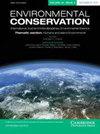Impact of soil and water conservation measures on farm productivity and income in the semi-arid tropics of Bundelkhand, central India
IF 2.6
3区 环境科学与生态学
Q2 BIODIVERSITY CONSERVATION
引用次数: 1
Abstract
Summary Soil and water are crucial resources for agriculture, especially in arid and semi-arid rain-fed areas, yet farm-level economic impacts and the factors influencing the adoption of measures for their conservation are little studied. The present study used data from 400 farm households to assess factors influencing the adoption of soil and water conservation measures (SWCMs) and their impacts on farm productivity and income in a semi-arid region of central India. We employed a probit model to determine the factors influencing the on-farm adoption of SWCMs and a propensity score matching technique for assessing their impacts. The findings indicate that farmer age and education, off-farm income, farm size and land ownership and access to training are key drivers of the adoption of SWCMs. SWCMs accentuated the input costs by INR 1689–2847 per ha during the rabi cropping season (October–February), but also increased crop productivity and net revenue from farming. The impact in the rabi season was less sensitive to the unobserved confounders than in the kharif season (June–September). Therefore, SWCMs could represent an important strategy for unlocking the cultivation potential of large rain-fed areas and for sustaining the livelihoods of farm households in the ecologically fragile arid and semi-arid tropics.印度中部邦德尔坎德半干旱热带地区水土保持措施对农业生产力和收入的影响
土壤和水是农业的重要资源,特别是在干旱和半干旱雨水灌溉地区,但对农场层面的经济影响以及影响采取保护措施的因素研究甚少。本研究使用了来自400个农户的数据,评估了影响印度中部半干旱地区采取水土保持措施的因素及其对农业生产力和收入的影响。我们采用了probit模型来确定影响农场采用SWCM的因素,并采用倾向得分匹配技术来评估其影响。研究结果表明,农民年龄和教育程度、非农收入、农场规模和土地所有权以及获得培训的机会是采用SWCM的关键驱动因素。在拉比种植季节(10月至2月),SWCM使投入成本每公顷增加1689至2847卢比,但也提高了作物生产力和农业净收入。拉比季节的影响对未观察到的混杂因素的敏感性低于哈里夫季节(6月至9月)。因此,SWCM可以代表一项重要战略,以释放大型雨水灌溉地区的种植潜力,并维持生态脆弱的干旱和半干旱热带地区农户的生计。
本文章由计算机程序翻译,如有差异,请以英文原文为准。
求助全文
约1分钟内获得全文
求助全文
来源期刊

Environmental Conservation
环境科学-环境科学
CiteScore
5.20
自引率
3.70%
发文量
43
审稿时长
>36 weeks
期刊介绍:
Environmental Conservation is one of the longest-standing, most highly-cited of the interdisciplinary environmental science journals. It includes research papers, reports, comments, subject reviews, and book reviews addressing environmental policy, practice, and natural and social science of environmental concern at the global level, informed by rigorous local level case studies. The journal"s scope is very broad, including issues in human institutions, ecosystem change, resource utilisation, terrestrial biomes, aquatic systems, and coastal and land use management. Environmental Conservation is essential reading for all environmentalists, managers, consultants, agency workers and scientists wishing to keep abreast of current developments in environmental science.
 求助内容:
求助内容: 应助结果提醒方式:
应助结果提醒方式:


